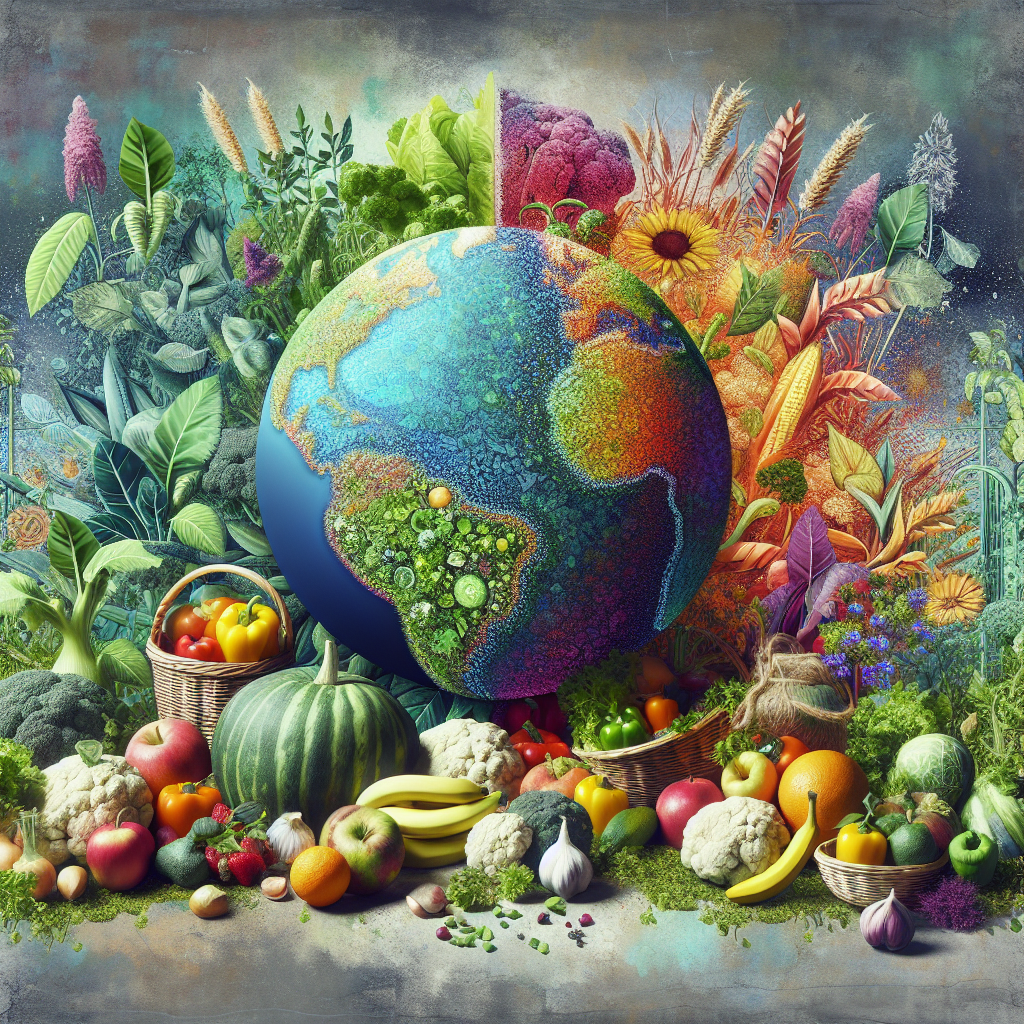The Benefits of Vegan: Sustainable Eating for a Healthier Planet

Switching to a vegan sustainable diet is a powerful way to help our planet and improve your health. By choosing plant-based foods, you can reduce your environmental impact, enjoy numerous health benefits, and support a more sustainable future for everyone. This article explores the many advantages of vegan sustainable eating and offers tips on how to start your journey.
Key Takeaways
- Vegan sustainable eating greatly reduces your carbon footprint and helps fight climate change.
- Plant-based diets offer numerous health benefits, including reducing the risk of chronic diseases.
- Starting a vegan sustainable diet is easier with simple food swaps and mindful shopping choices.
- Supporting local farmers and choosing seasonal produce can make your diet more sustainable.
- Debunking myths about vegan diets can help you make informed and healthy food choices.
Why Vegan Sustainable Eating Matters
Environmental Impact of Animal Agriculture
Animal agriculture is a major contributor to environmental issues like deforestation, water pollution, and greenhouse gas emissions. By choosing vegan sustainable eating, you help reduce these harmful impacts. Switching to a plant-based diet can significantly lower your carbon footprint. This simple change can make a big difference for our planet.
The Role of Plant-Based Diets in Sustainability
Plant-based diets are more sustainable because they require fewer resources like water and land. Growing plants for food is much more efficient than raising animals. This means that by eating more plants, we can help preserve our natural resources and ensure there's enough food for everyone.
Long-Term Benefits for Future Generations
When we choose vegan sustainable eating, we're not just helping ourselves; we're also helping future generations. Sustainable eating practices can lead to a healthier planet with more resources available for years to come. It's a way to ensure that our children and grandchildren can enjoy a thriving, healthy world.
By adopting vegan sustainable eating habits, you're making a positive impact on your health and the health of the planet. It's a choice that benefits everyone, now and in the future.
Health Perks of Vegan Sustainable Eating
Nutritional Benefits of Plant-Based Foods
Switching to a plant-based diet can be a game-changer for your health. Fruits and vegetables are packed with essential nutrients that your body needs. These foods are rich in vitamins, minerals, and antioxidants, which help in lowering inflammation and boosting your immune system. Eating a variety of plant-based foods ensures you get a balanced diet without the need for supplements.
Reducing Chronic Diseases
A vegan diet can significantly reduce the risk of chronic diseases like heart disease, diabetes, and certain cancers. Plant-based foods are low in saturated fats and high in fiber, which helps in maintaining a healthy weight and reducing cholesterol levels. By choosing a vegan lifestyle, you're not just helping the planet but also taking a big step towards a healthier you.
Boosting Mental Well-being
What you eat can have a profound impact on your mental health. A diet rich in fruits, vegetables, and whole grains can improve your mood and reduce symptoms of depression and anxiety. The nutrients found in plant-based foods, such as omega-3 fatty acids, play a crucial role in brain health. Incorporating these foods into your diet can help you feel more balanced and focused.
By taking care of your body with proper nutrition, you equip yourself to face challenges with a clear and focused mindset. Self-care is not selfish; it's necessary for your health and well-being.
How to Start Your Vegan Sustainable Journey
Simple Swaps for Everyday Meals
Starting your vegan journey doesn't have to be overwhelming. Begin with small changes, like having a meatless day each week or swapping dairy milk for a plant-based alternative. These simple swaps can make a big difference and are easy to incorporate into your daily routine.
Shopping Tips for Sustainable Choices
When shopping, focus on whole foods like fruits, vegetables, whole grains, legumes, nuts, and seeds. These items are not only plant-based but also packed with nutrients. Look for local and seasonal produce to reduce your carbon footprint and support local farmers.
Finding Community Support
Embarking on a plant-based journey is easier with a supportive community. Join social media groups or attend local meet-ups and cooking classes focused on vegan diets. These communities offer a space to share experiences, exchange recipes, and get support from others on a similar path.
Remember, every small step towards a plant-based diet contributes to a healthier planet and a healthier you. Stay motivated and enjoy the journey!
Economic Advantages of Vegan Sustainable Eating
Cost Savings on Groceries
Switching to a vegan diet can be a real money-saver. Plant-based foods like beans, rice, and vegetables are often cheaper than meat and dairy products. By choosing these options, you can cut down on your grocery bills significantly. Plus, buying in bulk can save even more money.
Supporting Local Farmers
When you opt for fresh, local produce, you support local farmers and boost the local economy. This not only helps small businesses but also reduces the carbon footprint associated with transporting food over long distances. Buying local is a win-win for your wallet and the planet.
Reducing Healthcare Costs
A vegan diet can lead to better health, which means fewer trips to the doctor. Eating more fruits and vegetables can lower the risk of chronic diseases like heart disease and diabetes. This translates to lower healthcare costs in the long run, saving you money and keeping you healthier.
Making the switch to a vegan diet isn't just good for the planet; it's also a smart financial move. By spending less on groceries and healthcare, you can save money while making a positive impact on the environment.
Debunking Myths About Vegan Sustainable Eating
Protein and Nutrient Concerns
One of the biggest myths about vegan diets is that they lack sufficient protein. This couldn't be further from the truth. There are plenty of plant-based protein sources like beans, lentils, tofu, and quinoa. These foods not only provide protein but also come packed with other essential nutrients. So, you can easily meet your protein needs without consuming animal products.
Affordability and Accessibility
Many people think that eating a vegan diet is expensive and hard to maintain. However, a vegan diet can actually be quite affordable. Staples like rice, beans, and seasonal vegetables are often cheaper than meat and dairy products. Plus, shopping at local farmers' markets can help you find fresh, affordable produce. It's all about making smart choices and planning your meals.
Taste and Variety
Another common myth is that vegan food is bland and lacks variety. In reality, vegan cuisine is incredibly diverse and flavorful. From spicy curries to hearty stews, there's no shortage of delicious vegan recipes. With a little creativity, you can make plant-based versions of your favorite dishes that are just as tasty, if not more so.
By consistently recognizing our achievements, we weave a narrative of success that propels us forward. This narrative is our own, unique to our journey, and it's filled with the small victories that collectively map the path to our larger goals.
Inspiring Stories of Vegan Sustainable Eaters
Personal Health Transformations
Many people have experienced amazing health changes after switching to a vegan diet. For instance, some have reported lower cholesterol levels and better heart health. One inspiring story is about a woman who managed to reverse her type 2 diabetes by adopting a plant-based diet. She now enjoys a more active lifestyle and feels more energetic than ever before.
Environmental Activism
Vegan sustainable eaters are often at the forefront of environmental activism. They understand the impact of their food choices on the planet and work tirelessly to promote sustainability. One notable example is a group that offers diverse courses on sustainability, wellness, and gardening for self-sufficiency and ecological harmony. Their efforts have inspired many to make more eco-friendly choices.
Community Initiatives
Communities around the world are coming together to support vegan sustainable eating. Local farmers' markets, community gardens, and educational workshops are just a few ways people are getting involved. These initiatives not only promote healthier eating habits but also strengthen community bonds. By working together, they are creating a more sustainable future for everyone.
Tips for Maintaining a Vegan Sustainable Lifestyle
Meal Planning and Preparation
Planning your meals ahead of time can keep you on track and make it easier to avoid excessive consumption of animal products. Start by creating a weekly menu that includes a variety of plant-based dishes. This not only saves time but also ensures you get a balanced diet. Consistency is key to maintaining any lifestyle change, and meal planning is a great way to stay committed.
Eating Out and Social Situations
When eating out, look for plant-based options on the menu or ask if substitutions can be made. Many restaurants now offer vegan or vegetarian options, so don’t be afraid to ask. If you're attending a social event, consider bringing a vegan dish to share. This way, you know there will be something you can eat, and you might even inspire others to try it!
Staying Motivated and Informed
Staying motivated can be challenging, but surrounding yourself with a supportive community can make a big difference. Join online forums or local groups where you can share tips and recipes. Keep yourself informed about the benefits of a vegan lifestyle and the positive impact it has on the environment. This knowledge can be a powerful motivator to stay on your vegan journey.
Embracing a greener lifestyle can be an exciting journey, but it also poses some challenges. However, if you’re set on this new, sustainable way of living and eating, you can overcome these obstacles by utilizing the following tips.
By incorporating these tips into your daily routine, you'll find it easier to maintain a vegan sustainable lifestyle. Remember, every small step counts towards a healthier planet and a healthier you.
Conclusion
Switching to a vegan, sustainable diet is a win-win for both our health and the planet. By choosing plant-based foods, we can reduce our carbon footprint, conserve water, and protect natural habitats. Plus, the health benefits are undeniable, from lowering inflammation to boosting overall wellness. It's clear that small changes in our eating habits can lead to big impacts. So, let's embrace this positive shift and contribute to a healthier, more sustainable world. Every meal is a chance to make a difference!
Frequently Asked Questions
What is vegan sustainable eating?
Vegan sustainable eating means choosing plant-based foods that are grown and produced in ways that are good for the environment. It focuses on reducing harm to animals and minimizing our impact on the planet.
Is it hard to get enough protein on a vegan diet?
Not really. There are plenty of plant-based sources of protein like beans, lentils, tofu, and nuts. By eating a variety of these foods, you can easily meet your protein needs.
Are vegan foods expensive?
They don't have to be. Many vegan staples like rice, beans, and seasonal vegetables are quite affordable. Planning meals and buying in bulk can also help save money.
Can a vegan diet help with chronic diseases?
Yes, a vegan diet can lower the risk of chronic diseases like heart disease, diabetes, and certain cancers. Plant-based foods are rich in nutrients that support overall health.
How do I start eating vegan sustainably?
Start by making simple swaps, like using plant-based milk instead of dairy. Shop for seasonal and local produce, and try to reduce food waste by planning your meals.
Will I miss out on tasty foods if I go vegan?
Not at all! There are many delicious vegan recipes and alternatives for almost any dish. With a bit of creativity, you can enjoy a wide variety of tasty meals.

